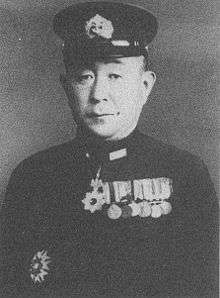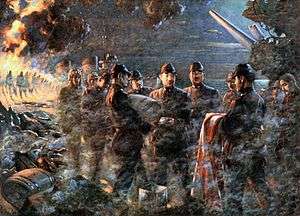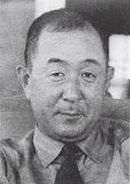Tamon Yamaguchi
| Tamon Yamaguchi | |
|---|---|
 | |
| Native name | 山口 多聞 |
| Born |
August 17, 1892 Tokyo, Japan |
| Died |
June 4, 1942 (aged 49)[1] Pacific Ocean (near Midway Island) |
| Allegiance |
|
| Service/branch |
|
| Years of service | 1912-1942 |
| Rank | Vice Admiral |
| Commands held |
Isuzu, Ise IJN 5th Fleet, 2nd Carrier Division |
| Battles/wars | |
| Awards |
|

Tamon Yamaguchi (山口 多聞 Yamaguchi Tamon, 17 August 1892 – 4 June 1942) was a Japanese admiral in the Imperial Japanese Navy in World War II and an alumnus of Princeton University (1921–1923).
Biography
Born in Koishikawa Tokyo, Yamaguchi graduated from the 40th class of the Imperial Japanese Naval Academy in 1912, ranked second out of 144 cadets. As a midshipman, he served on the cruiser Soya and battleship Settsu. After his commissioning as an ensign, he was assigned to the cruiser Chikuma and battleship Aki.
Yamaguchi attended naval artillery and torpedo school in 1915–1916, and was then assigned to the destroyer Kashi.
By 1918, Yamaguchi had been promoted to lieutenant and was assigned to a navigation unit with the naval squadron escorting Imperial German Navy submarines received by the Japanese government as part of reparation payments from Germany at the end of World War I. He then traveled to the United States and attended Princeton University from 1921-1923. On his return to Japan the following year, he served on the battleship Nagato for six months, before graduating from the Naval Staff College with honors in 1924. Yamaguchi was promoted to lieutenant commander in 1924.
A member of the Imperial Japanese Navy General Staff in 1927, Yamaguchi was promoted commander the next year and later assigned to the Japanese delegation at the London Naval Conference in 1929-1930. On his return to Japan, he was assigned as executive officer on the cruiser Yura.
Promoted to captain in 1932, Yamaguchi was the naval attaché to Washington, DC from 1934-1937. On his return to Japan, he was assigned as captain to the cruiser Isuzu (from 1936–1937), followed by the battleship Ise (from 1937–1938).
Promoted to rear admiral on 15 November 1938, he was commander of the First Combined Air Group during the early stages of the Second Sino-Japanese War. He directed the saturation bombing campaign in central China through 1940, until his appointment as commander of the 2nd Carrier Division, consisting of the aircraft carriers Sōryū and Hiryū.[3]
Yamaguchi′s carrier force was part of the attack on Pearl Harbor, sheltering many of the planes that would attack the port. Yamaguchi commanded a force of planes at the Battle of Wake Island, saving his comrade Eiji Gotō's force from destruction, and subsequently participated in the Indian Ocean Raid.
During the Battle of Midway, Yamaguchi sparred with his superior officer, Admiral Chūichi Nagumo, when a reconnaissance plane discovered an American aircraft carrier (USS Yorktown) near Midway. At the time, the Japanese carriers′ planes were armed with bombs. Nagumo wished to switch the armament to torpedoes. Yamaguchi demanded that no time be wasted and that the planes be launched to attack the American carrier with bombs. Nagumo rejected this; shortly afterward, American carrier aircraft destroyed all the Japanese carriers except Yamaguchi′s flagship Hiryū. Yamaguchi quickly ordered two successive attacks on Yorktown which crippled it. Shortly afterward, another carrier air strike against Hiryū resulted in hits by aircraft from USS Enterprise.
Yamaguchi was killed in action, choosing to go down with the sinking aircraft carrier. Legend has it that he and the captain of Hiryū, Tomeo Kaku, went down with the stricken carrier while calmly admiring the moon. He was posthumously promoted to the rank of vice admiral.
Promotions

- Midshipman - 17 July 1912
- Ensign - 1 December 1913
- Sublieutenant - 13 December 1915
- Lieutenant - 1 December 1918
- Lieutenant Commander - 1 December 1924
- Commander - 10 December 1928
- Captain - 1 December 1932
- Rear Admiral - 15 November 1938
- Vice Admiral - 5 June 1942 (Posthumous)[4]
Media portrayals
In the 1960 film Hawaii Midway Ocean Combat; The Storm in The Pacific (ハワイ・ミッドウェイ大海空戦 太平洋の嵐), Yamaguchi was portrayed by Toshiro Mifune.
In the 1970 film Tora! Tora! Tora!, Yamaguchi was portrayed by Susumu Fujita.
In the 1976 film Midway, Yamaguchi was portrayed by Hawaiian actor John Fujioka.[5]
In 2009, he is portrayed in the manga series in Kouta Hirano's Drifters series.
In Toei's 2011 war film Commander-in-Chief of the Combined Fleet Yamamoto Isoroku (聯合艦隊司令長官 山本五十六), Yamaguchi was portrayed by Hiroshi Abe.[6]
In the 2016 anime series, Drifters.
References
Books
- Fuchida, Mitsuo (with C.H. Kawakami and Roger Pineau), Midway - The Battle that Doomed Japan: The Japanese Navy's Story, Annapolis, 1955.
- Fuller, Richard (1992). Shokan: Hirohito's Samurai. London: Arms and Armour Press. ISBN 1-85409-151-4.
- Peattie, Mark R., Sunburst: The Rise of Japanese Naval Air Power 1909-1941, Annapolis, Maryland: Naval Institute Press, 2001, ISBN 1-55750-432-6
External links
- Nishida, Hiroshi. "Imperial Japanese Navy". Retrieved 2007-08-25.
- Chen, Peter. "WW2DB: Yamaguchi, Tamon". Retrieved 2007-08-25.
- "Combinedfleet.com, Yamaguchi, Tamon". Retrieved 2007-08-25.
- Kita Renzo's famous painting of Yamaguchi's Last Moments
Notes
- ↑ Nishida, Imperial Japanese Navy.
- ↑ Yamaguchi Tamon at navalhistory.flixco.info
- ↑ Peattie, p. 219
- ↑ Nishida, Imperial Japanese Navy
- ↑ Midway (1976) at IMDB.com
- ↑ Isoroku Yamamoto, the Commander-in-Chief of the Combined Fleet (2011) at IMDB.com